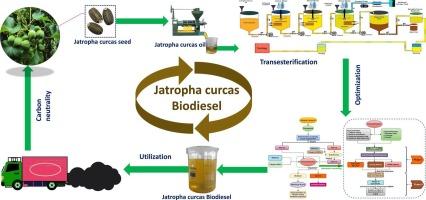基于先进酯交换反应的麻疯树生物柴油合成的混合熵- vikor优化
Q1 Environmental Science
引用次数: 0
摘要
生物柴油是由甘油三酯转化而来的,是一种可持续的、环保的化石柴油替代品,可以满足日益增长的全球能源需求。富含脂质、不可食用的麻疯树油是生物柴油合成的主要原料。本研究采用间歇式酯交换反应器,以均相KOH为催化剂,对麻疯树油转化为生物柴油进行了实验研究。本研究研究了一种使用分数析因设计进行筛选的组合方法,然后采用一种新的混合熵- vikor方法对实验替代方案进行排序,以实现生产的生物柴油的最大产量和最小粘度。采用单独的统计方法分析了酯交换反应输入参数(催化剂负载和反应温度、化学相互作用时间、甲醇与脂质摩尔比)对所得收率、粘度和密度的综合影响,采用三维曲面图和经验关系。结果表明,麻疯树油在均碱催化剂用量1.5% (w/w)、反应温度65℃、反应时间120 min、醇脂摩尔比为6:1的条件下,产率为93.16%、粘度为4.0 cSt、密度为871 ~ 881 kg/m3。麻疯树油基生物柴油的合成物在国际EN 14214标准规定的范围内具有物理化学特性。本文章由计算机程序翻译,如有差异,请以英文原文为准。

Hybrid entropy-VIKOR optimization of Jatropha curcas biodiesel synthesis with advanced transesterification reaction input parametric analysis for yield, viscosity, and density
Biodiesel, derived from triglyceride conversion, presents itself as a sustainable and environmentally friendly alternative to fossil diesel fuel to meet the increasing global energy demand. Lipid-rich, non-edible Jatropha curcas oil presents itself as a prime feedstock for biodiesel synthesis. A batch transesterification reactor was used in this research to experimentally facilitate the conversion of Jatropha curcas oil into biodiesel with homogenous KOH as a catalyst. The present study investigates a combined approach using a fractional factorial design for screening, followed by a novel hybrid Entropy-VIKOR approach for ranking experimental alternatives to achieve maximum yield and minimum viscosity of produced biodiesel. A separate statistical approach is also employed to analyze the combined effects of transesterification reaction input parameters (catalyst loading and reaction temperature; chemical interaction time, and methanol-to-lipid molar ratio) on the resulting yield, viscosity, and density, using 3D surface plots and empirical relations. The combined experimental and numerical based investigation indicated that the optimum biodiesel produced from Jatropha curcas oil with yield: 93.16 %, viscosity: 4.0 cSt, and density: 871–881 kg/m3 and these results are obtained under the following conditions: Homogenous base catalyst loading of 1.5 % (w/w), reaction temperature of 65 °C, chemical interaction time of 120 min, and a methanol-to-lipid molar ratio of 6:1. The resulting composition of Jatropha curcas oil-based biodiesel have physicochemical characteristics within specified limits as per international EN 14214 standards.
求助全文
通过发布文献求助,成功后即可免费获取论文全文。
去求助
来源期刊

Bioresource Technology Reports
Environmental Science-Environmental Engineering
CiteScore
7.20
自引率
0.00%
发文量
390
审稿时长
28 days
 求助内容:
求助内容: 应助结果提醒方式:
应助结果提醒方式:


